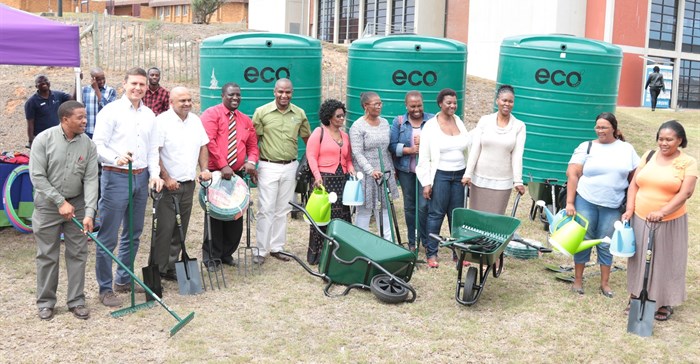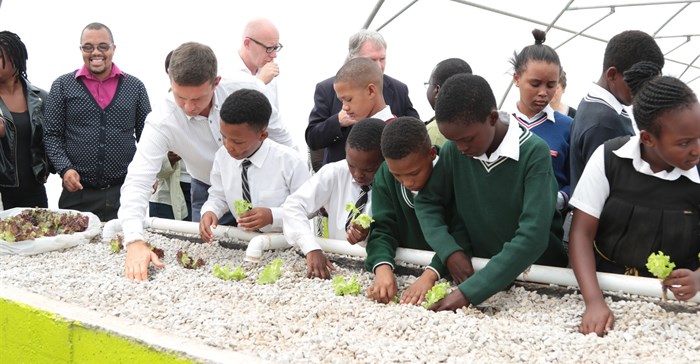
Government officials, the private sector, and local schools were treated to a tour of the facility - one of two commercial-sized aquaponics units that the Foundation and INMED are building as part of their R37 million Health in Action programme. A second aquaponics system will provide healthy, nutrient-rich produce to primary schools in the Soweto area. Construction of this system will begin later this year.
The facility at NMMU will provide children from primary schools in low-income communities of Port Elizabeth with access to fresh, nutritious produce. INMED has been working in South Africa for over ten years where it has pioneered aquaponics production to promote healthy nutrition and income generation. “Daily consumption of fresh produce is widely acknowledged as key to a well-balanced diet, yet for many in low-income communities, healthy food choices are often out of reach,” said Joost Vlaanderen, Mondelez South Africa’s managing director. “The aquaponics facilities will help address this challenge.”
Health in Action is a four-year primary school-based wellness programme launched in 2015 that is funded by the Foundation and implemented by INMED in South Africa. It aims to nurture a sustainable, healthy lifestyle culture in schools and communities to help build a healthier future for South Africa’s children. “Health in Action reaches more than 100,000 primary school children annually aged six to 12 years in 116 schools in 13 at-risk communities in Gauteng and the Eastern Cape,” said Unathi Sihlahla, programme director of INMED South Africa. “Its three main goals are to ensure school children from disadvantaged communities have access to nutritious food, get enough physical exercise and learn about nutrition through the national school curriculum.”
The Port Elizabeth aquaponics system is approximately 223 square meters in size and will at maximum capacity produce approximately two tonnes of various greens and approximately 1,9 tonnes of fish annually. It will provide fresh produce to supplement the nutritional needs of children at various schools in the Nelson Mandela Bay Metropolitan area.
While fish will be harvested twice a year, vegetables will be available throughout the year once the system is running. The facility comprises five fish tanks filled with tilapia, as well as nine grow beds planted with a variety of fast-growing crops. Lettuce, spinach, peppers, cucumbers and herbs are among the nutritious, organic fresh produce that is being grown in the system. The aquaponics plant will also provide research opportunities for agricultural students from NMMU.

In an aquaponics system, water from the fish tanks is enriched with natural nutrients from waste produced by the fish. That water is then fed into the plant grow beds where the waste is converted into nutrient-rich food the plants absorb. The plants then provide a natural filter to purify the water, thereby circulating clean water back into the fish tanks. As a result, aquaponics utilises about 90% less water than traditional farming methods and yields abundant and marketable fresh produce and fish.
“It is fitting that we are introducing our facility amid South Africa’s National Water Week celebrations,” said Vlaanderen. “We believe these aquaponic systems will go a long way towards helping us achieve our goal of giving children and families from at-risk communities access to fresh, healthy and nutritious foods - a key pillar of our Health in Action program,” he commented.
Sihlahla highlighted the importance of adopting sustainable food production practices that conserve natural resources at a time when drought has been threatening the water supply and food security in the Nelson Mandela Bay region. “Commercial aquaponics systems typically generate crop yields that are up to 10 times higher than equivalent-sized plots that are traditionally cultivated, making aquaponics a desirable tool for economic development,” Sihlahla noted.
Linda Pfeiffer, president and CEO of INMED Partnerships for Children, added that the organisation is proud to partner with the Mondelēz International Foundation to improve the nutrition and wellbeing of South African children and their communities. “Through our work with the Foundation in Brazil, we’ve seen dramatic improvements in children’s body mass index and we are working diligently to achieve the same results through collaborative partnerships with school administrators, local governments, non-governmental organisations and communities in South Africa,” she said.
“Developing a healthy mind and body through good nutrition and physical activity and educating children, their parents, and their communities about the positive impact these can have on their health, wellbeing, and development is key to giving children the best chance at success as they grow and develop,” Vlaanderen noted.
The Health in Action programme also resources schools with water harvesting tanks, garden equipment, seeds and active play equipment, such as soccer and rugby balls.